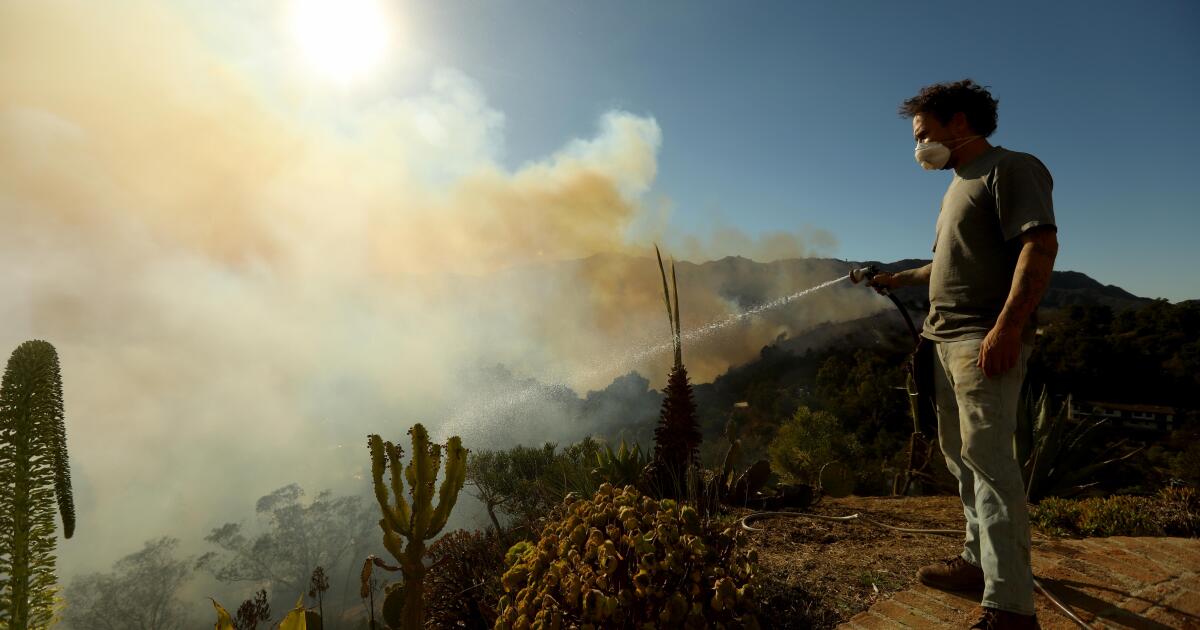Science
British Bees Face a Deadly Invasion

A sharp increase in the number of an invasive species of hornets in Britain is raising concerns that they could threaten native bee populations.
There have been 22 sightings of the so-called Asian hornet, or Vespa velutina, this year, more than in the past six years combined, according to British officials. The number of sightings, confirmed when specimens have been analyzed in a laboratory, is up from two last year, two in 2021 and one in 2020, according to British government statistics. The hornet, which is native to parts of Asia, was first detected in Britain in 2016, and its activity peaks in August and September.
It is distinct from the world’s largest hornet, Vespa mandarinia, which has been referred to as the “Asian giant hornet” or “murder hornet,” and was found in the Pacific Northwest of the United States in 2019.
Smaller than Britain’s native hornet, most Asian hornets are about an inch long and have brown thoraxes, yellow legs and black heads with orange faces. The species was first recorded in France in 2005 and is thought to have arrived in a container of pottery from China, according to the Non-Native Species Secretariat, a British organization that coordinates responses to invasive species. Since arriving in France, the population of Asian hornets has grown rapidly. As of last year, the hornets have been seen in European countries including Germany, Spain, Portugal and Italy, according to the National Bee Unit, a British agency.
Asian hornets can be devastating to ecosystems and can wipe out bee populations, including honey bee colonies, in as little as several days, Luke Whyatt, a bee farmer in Britain, said on a phone call from the island of Jersey, in the English Channel, where he is leading an Asian hornet track-and-trace training program.
“With what’s going on in the U.K. and the number of nests that have been discovered, we feel we’re going to be sooner or later inundated with nests of hornets,” Mr. Whyatt said.
Nicola Spence, the British government’s plant and bee health officer, said the government was encouraging the public to report sightings so that hornet nests could be destroyed and hornets could be prevented from posing a threat to bees and other insects.
“While the Asian hornet poses no greater risk to human health than other wasps or hornets, they can cause damage to honey bee colonies and other beneficial insects,” she said in a statement. Bees support biodiversity and agriculture, pollinating trees, flowers and crops.
Observers have noted that Asian hornets tend to hover about a foot away from the entrance to a beehive, before charging bees and forcing them to the ground. They then paralyze them and carry the bees away. By hovering, they can also force bees to stay in their hives, preventing them from being able to get food or water, said Diane Drinkwater, chair of the British Beekeepers Association.
She said that if Asian hornets grew in numbers in Britain, they could decimate honeybees and other insects. “We are quite concerned,” she said. “These hornets will eat lots of bees and deplete the colony so much that it sort of gives up.”
This week, a dozen beekeepers traveled from England to Jersey, where there are hundreds of Asian hornets, for the training program, which involves painting the backs of Asian hornets with colored markers and releasing them. Using bait, beekeepers measure how long it takes the hornets to return and use the information to locate their nests. For example, if the hornets return in four minutes, beekeepers can estimate that their nests are about 1,300 feet (400 meters) away, he said.
Mr. Whyatt, the bee farmer, described the Asian hornets as “quite docile” and said beekeepers and bee farmers could mark them without using any protective equipment. They become aggressive, however, if their nests are disturbed. “If a human stands on a nest or disturbs the nest,” he said, “then it’s possible the human is in trouble.”

Science
There's a reason you can't stop doomscrolling through L.A.'s fire disaster

Even for those lucky enough to get out in time, or to live outside the evacuation zones, there has been no escape from the fires in the Los Angeles area this week.
There is hardly a vantage point in the city from which flames or plumes of smoke are not visible, nowhere the scent of burning memories can’t reach.
And on our screens — on seemingly every channel and social media feed and text thread and WhatsApp group — an endless carousel of images documents a level of fear, loss and grief that felt unimaginable here as recently as Tuesday morning.
Even in places of physical safety, many in Los Angeles are finding it difficult to look away from the worst of the destruction online.
“To me it’s more comfortable to doomscroll than to sit and wait,” said Clara Sterling, who evacuated from her home Wednesday. “I would rather know exactly where the fire is going and where it’s headed than not know anything at all.”
A writer and comedian, Sterling is — by her own admission — extremely online. But the nature of this week’s fires make it particularly hard to disengage from news coverage and social media, experts said.
For one, there’s a material difference between scrolling through images of a far-off crisis and staying informed about an active disaster unfolding in your neighborhood, said Casey Fiesler, an associate professor specializing in tech ethics at the University of Colorado Boulder.
“It’s weird to even think of it as ‘doomscrolling,’ ” she said. “When you’re in it, you’re also looking for important information that can be really hard to get.”
When you share an identity with the victims of a traumatic event, you’re more likely both to seek out media coverage of the experience and to feel more distressed by the media you see, said Roxane Cohen Silver, distinguished professor of psychological science at UC Irvine.
For Los Angeles residents, this week’s fires are affecting the people we identify with most intimately: family, friends and community members. They have consumed places and landmarks that feature prominently in fond memories and regular routines.
The ubiquitous images have also fueled painful memories for those who have lived through similar disasters — a group whose numbers have increased as wildfires have grown more frequent in California, Silver said.
This she knows personally: She evacuated from the Laguna Beach fires in 1993, and began a long-term study of that fire’s survivors days after returning to her home.
“Throughout California, throughout the West, throughout communities that have had wildfire experience, we are particularly primed and sensitized to that news,” she said. “And the more we immerse ourselves in that news, the more likely we are to experience distress.”
Absorption in these images of fire and ash can cause trauma of its own, said Jyoti Mishra, an associate professor of psychiatry at UC San Diego who studied the long-term psychological health of survivors of the 2018 Camp fire.
The team identified lingering symptoms of post-traumatic stress disorder, depression and anxiety both among survivors who personally experienced fire-related trauma such as injury or property loss, and — to a smaller but still significant degree — among those who indirectly experienced the trauma as witnesses.
“If you’re witnessing [trauma] in the media, happening on the streets that you’ve lived on and walked on, and you can really put yourself in that place, then it can definitely be impactful,” said Mishra, who’s also co-director of the UC Climate Change and Mental Health Council. “Psychology and neuroscience research has shown that images and videos that generate a sense of personal meaning can have deep emotional impacts.”
The emotional pull of the videos and images on social media make it hard to look away, even as many find the information there much harder to trust.
Like many others, Sterling spent a lot of time online during the early days of the COVID-19 pandemic. Back then, Sterling said, the social media environment felt decidedly different.
“This time around I think I feel less informed about what’s going on because there’s been such a big push toward not fact-checking and getting rid of verified accounts,” she said.
The rise of AI-generated images and photos has added another troubling kink, as Sterling highlighted in a video posted to TikTok early Thursday.
“The Hollywood sign was not on fire last night. Any video or photos that you saw of the Hollywood sign on fire were fake. They were AI generated,” she said, posting from a hotel in San Diego after evacuating.
Hunter Ditch, a producer and voice actor in Lake Balboa, raised similar concerns about the lack of accurate information. Some social media content she’s encountered seemed “very polarizing” or political, and some exaggerated the scope of the disaster or featured complete fabrications, such as that flaming Hollywood sign.
The spread of false information has added another layer of stress, she said. This week, she started turning to other types of app — like the disaster mapping app, Watch Duty — to track the spreading fires and changing evacuation zones.
But that made her wonder: “If I have to check a whole other app for accurate information, then what am I even doing on social media at all?”
Science
Pink Fire Retardant, a Dramatic Wildfire Weapon, Poses Its Own Dangers

From above the raging flames, these planes can unleash immense tankfuls of bright pink fire retardant in just 20 seconds. They have long been considered vital in the battle against wildfires.
But emerging research has shown that the millions of gallons of retardant sprayed on the landscape to tame wildfires each year come with a toxic burden, because they contain heavy metals and other chemicals that are harmful to human health and the environment.
The toxicity presents a stark dilemma. These tankers and their cargo are a powerful tool for taming deadly blazes. Yet as wildfires intensify and become more frequent in an era of climate change, firefighters are using them more often, and in the process releasing more harmful chemicals into the environment.
Some environmental groups have questioned the retardants’ effectiveness and potential for harm. The efficiency of fire retardant has been hard to measure, because it’s one of a barrage of firefighting tactics deployed in a major fire. After the flames are doused, it’s difficult to assign credit.
The frequency and severity of wildfires has grown in recent years, particularly in the western United States. Scientists have also found that fires across the region have become faster moving in recent decades.
There are also the longer-term health effects of exposure to wildfire smoke, which can penetrate the lungs and heart, causing disease. A recent global survey of the health effects of air pollution caused by wildfires found that in the United States, exposure to wildfire smoke had increased by 77 percent since 2002. Globally, wildfire smoke has been estimated to be responsible for up to 675,000 premature deaths per year.
Fire retardants add to those health and environmental burdens because they present “a really, really thorny trade-off,” said Daniel McCurry, an assistant professor of civil and environmental engineering at the University of Southern California, who led the recent research on their heavy-metal content.
The United States Forest Service said on Thursday that nine large retardant-spraying planes, as well as 20 water-dropping helicopters, were being deployed to fight the Southern California fires, which have displaced tens of thousands of people. Several “water scooper” amphibious planes, capable of skimming the surface of the sea or other body of water to fill their tanks, are also being used.
Two large DC-10 aircraft, dubbed “Very Large Airtankers” and capable of delivering up to 9,400 gallons of retardant, were also set to join the fleet imminently, said Stanton Florea, a spokesman for the National Interagency Fire Center in Boise, Idaho, which coordinates national wildland firefighting efforts across the West.
Sprayed ahead of the fire, the retardants coat vegetation and prevent oxygen from allowing it to burn, Mr. Florea said. (Red dye is added so firefighters can see the retardant against the landscape.) And the retardant, typically made of salts like ammonium polyphosphate, “lasts longer. It doesn’t evaporate, like dropping water,” he said.
The new research from Dr. McCurry and his colleagues found, however, that at least four different types of heavy metals in a common type of retardant used by firefighters exceeded California’s requirements for hazardous waste.
Federal data shows that more than 440 million gallons of retardant were applied to federal, state, and private land between 2009 and 2021. Using that figure, the researchers estimated that between 2009 and 2021, more than 400 tons of heavy metals were released into the environment from fire suppression, a third of that in Southern California.
Both the federal government and the retardant’s manufacturer, Perimeter Solutions, have disputed that analysis, saying the researchers had evaluated a different version of the retardant. Dan Green, a spokesman for Perimeter, said retardants used for aerial firefighting had passed “extensive testing to confirm they meet strict standards for aquatic and mammalian safety.”
Still, the findings help explain why concentrations of heavy metals tend to surge in rivers and streams after wildfires, sometimes by hundreds of times. And as scrutiny of fire suppressants has grown, the Forestry Service has set buffer zones surrounding lakes and rivers, though its own data shows retardant still inadvertently drifts into those waters.
In 2022, the environmental nonprofit Forest Service Employees for Environmental Ethics sued the government in federal court in Montana, demanding that the Forest Service obtain a permit under the Clean Water Act to cover accidental spraying into waterways.
The judge ruled that the agency did indeed need to obtain a permit. But it allowed retardant use to continue to protect lives and property.
Science
2024 Brought the World to a Dangerous Warming Threshold. Now What?

Source: Copernicus/ECMWF
Note: Temperature anomalies relative to 1850-1900 averages.
At the stroke of midnight on Dec. 31, Earth finished up its hottest year in recorded history, scientists said on Friday. The previous hottest year was 2023. And the next one will be upon us before long: By continuing to burn huge amounts of coal, oil and gas, humankind has all but guaranteed it.
The planet’s record-high average temperature last year reflected the weekslong, 104-degree-Fahrenheit spring heat waves that shuttered schools in Bangladesh and India. It reflected the effects of the bathtub-warm ocean waters that supercharged hurricanes in the Gulf of Mexico and cyclones in the Philippines. And it reflected the roasting summer and fall conditions that primed Los Angeles this week for the most destructive wildfires in its history.
“We are facing a very new climate and new challenges, challenges that our society is not prepared for,” said Carlo Buontempo, director of the Copernicus Climate Change Service, the European Union monitoring agency.
But even within this progression of warmer years and ever-intensifying risks to homes, communities and the environment, 2024 stood out in another unwelcome way. According to Copernicus, it was the first year in which global temperatures averaged more than 1.5 degrees Celsius, or 2.7 degrees Fahrenheit, above those the planet experienced at the start of the industrial age.
For the past decade, the world has sought to avoid crossing this dangerous threshold. Nations enshrined the goal in the 2015 Paris agreement to fight climate change. “Keep 1.5 alive” was the mantra at United Nations summits.
Yet here we are. Global temperatures will fluctuate somewhat, as they always do, which is why scientists often look at warming averaged over longer periods, not just a single year.
But even by that standard, staying below 1.5 degrees looks increasingly unattainable, according to researchers who have run the numbers. Globally, despite hundreds of billions of dollars invested in clean-energy technologies, carbon dioxide emissions hit a record in 2024 and show no signs of dropping.
One recent study published in the journal Nature concluded that the absolute best humanity can now hope for is around 1.6 degrees of warming. To achieve it, nations would need to start slashing emissions at a pace that would strain political, social and economic feasibility.
But what if we’d started earlier?
By spewing heat-trapping gases into the atmosphere, humankind has lifted global temperatures to record highs.
If nations had started reducing emissions in 2005, they could have made gradual cuts to limit warming to 1.5 degrees.
Starting in 2015, when the Paris agreement was adopted, would have required steeper cuts.
Starting today would require cuts so drastic as to appear essentially impossible.
“It was guaranteed we’d get to this point where the gap between reality and the trajectory we needed for 1.5 degrees was so big it was ridiculous,” said David Victor, a professor of public policy at the University of California, San Diego.
The question now is what, if anything, should replace 1.5 as a lodestar for nations’ climate aspirations.
“These top-level goals are at best a compass,” Dr. Victor said. “They’re a reminder that if we don’t do more, we’re in for significant climate impacts.”
The 1.5-degree threshold was never the difference between safety and ruin, between hope and despair. It was a number negotiated by governments trying to answer a big question: What’s the highest global temperature increase — and the associated level of dangers, whether heat waves or wildfires or melting glaciers — that our societies should strive to avoid?
The result, as codified in the Paris agreement, was that nations would aspire to hold warming to “well below” 2 degrees Celsius while “pursuing efforts” to limit it to 1.5 degrees.
Even at the time, some experts called the latter goal unrealistic, because it required such deep and rapid emissions cuts. Still, the United States, the European Union and other governments adopted it as a guidepost for climate policy.
Christoph Bertram, an associate research professor at the University of Maryland’s Center for Global Sustainability, said the urgency of the 1.5 target spurred companies of all kinds — automakers, cement manufacturers, electric utilities — to start thinking hard about what it would mean to zero out their emissions by midcentury. “I do think that has led to some serious action,” Dr. Bertram said.
But the high aspiration of the 1.5 target also exposed deep fault lines among nations.
China and India never backed the goal, since it required them to curb their use of coal, gas and oil at a pace they said would hamstring their development. Rich countries that were struggling to cut their own emissions began choking off funding in the developing world for fossil-fuel projects that were economically beneficial. Some low-income countries felt it was deeply unfair to ask them to sacrifice for the climate given that it was wealthy nations — and not them — that had produced most of the greenhouse gases now warming the world.
“The 1.5-degree target has created a lot of tension between rich and poor countries,” said Vijaya Ramachandran, director for energy and development at the Breakthrough Institute, an environmental research organization.
Costa Samaras, an environmental-engineering professor at Carnegie Mellon University, compared the warming goals to health officials’ guidelines on, say, cholesterol. “We don’t set health targets on what’s realistic or what’s possible,” Dr. Samaras said. “We say, ‘This is what’s good for you. This is how you’re going to not get sick.’”
“If we were going to say, ‘Well, 1.5 is likely out of the question, let’s put it to 1.75,’ it gives people a false sense of assurance that 1.5 was not that important,” said Dr. Samaras, who helped shape U.S. climate policy from 2021 to 2024 in the White House Office of Science and Technology Policy. “It’s hugely important.”
Scientists convened by the United Nations have concluded that restricting warming to 1.5 degrees instead of 2 would spare tens of millions of people from being exposed to life-threatening heat waves, water shortages and coastal flooding. It might mean the difference between a world that has coral reefs and Arctic sea ice in the summer, and one that doesn’t.
Each tiny increment of additional warming, whether it’s 1.6 degrees versus 1.5, or 1.7 versus 1.6, increases the risks. “Even if the world overshoots 1.5 degrees, and the chances of this happening are increasing every day, we must keep striving” to bring emissions to zero as soon as possible, said Inger Anderson, the executive director of the United Nations Environment Program.
Officially, the sun has not yet set on the 1.5 target. The Paris agreement remains in force, even as President-elect Donald J. Trump vows to withdraw the United States from it for a second time. At U.N. climate negotiations, talk of 1.5 has become more muted compared with years past. But it has hardly gone away.
“With appropriate measures, 1.5 Celsius is still achievable,” Cedric Schuster, the minister of natural resources and environment for the Pacific island nation of Samoa, said at last year’s summit in Azerbaijan. Countries should “rise to the occasion with new, highly ambitious” policies, he said.
To Dr. Victor of U.C. San Diego, it is strange but all too predictable that governments keep speaking this way about what appears to be an unachievable aim. “No major political leader who wants to be taken seriously on climate wants to stick their neck out and say, ‘1.5 degrees isn’t feasible. Let’s talk about more realistic goals,’” he said.
Still, the world will eventually need to have that discussion, Dr. Victor said. And it’s unclear how it will go.
“It could be constructive, where we start asking, ‘How much warming are we really in for? And how do we deal with that?’” he said. “Or it could look very toxic, with a bunch of political finger pointing.”
Methodology
The second chart shows pathways for reducing carbon emissions that would have a 66 percent chance of limiting global warming this century to 1.5 degrees Celsius above the preindustrial average.
-

 Business1 week ago
Business1 week agoThese are the top 7 issues facing the struggling restaurant industry in 2025
-

 Culture1 week ago
Culture1 week agoThe 25 worst losses in college football history, including Baylor’s 2024 entry at Colorado
-

 Sports1 week ago
Sports1 week agoThe top out-of-contract players available as free transfers: Kimmich, De Bruyne, Van Dijk…
-

 Politics1 week ago
Politics1 week agoNew Orleans attacker had 'remote detonator' for explosives in French Quarter, Biden says
-

 Politics1 week ago
Politics1 week agoCarter's judicial picks reshaped the federal bench across the country
-

 Politics6 days ago
Politics6 days agoWho Are the Recipients of the Presidential Medal of Freedom?
-

 Health5 days ago
Health5 days agoOzempic ‘microdosing’ is the new weight-loss trend: Should you try it?
-

 World1 week ago
World1 week agoIvory Coast says French troops to leave country after decades














